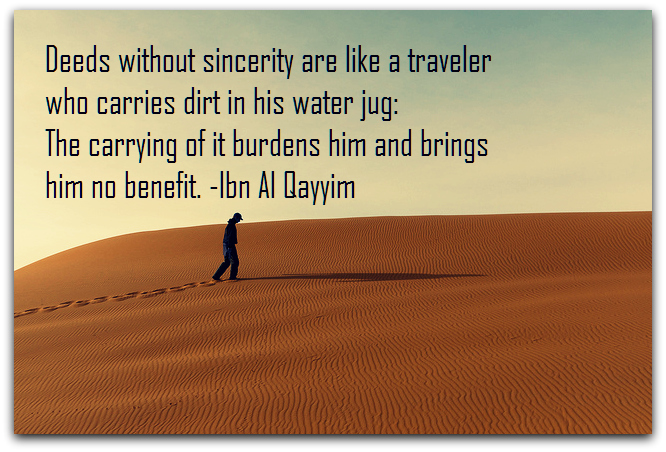Linguistically: It is extracted from the verb (Akhlas) whose source is (Ikhlaas), which means to make pure and not mixed with anything else.
This is why Chapter Al-Ikhlaas was given this name, because it emphasizes the Oneness of Allah and that He should be worshipped alone. Ibn Al-Atheer (rahimahullah) said:
“It was given this name because the one who recites it purifies his monotheism to Allah.”
The word Ikhlaas is the word of Tawheed (monotheism).
Al-Fayrooz Abaadi (rahimahullah) said:
“Akhlasa means to give up Riyaa’ (showing off) [i.e. offer worship purely for Allah].”
Al-Qaamoos Al-Muheet (797).
Al-Jurjaani (rahimahullah) said:
“Ikhlaas is to give up Riyaa’ when offering acts of worship.”
At-Ta’reefaat (28).
Technically: In Islamic terminology, the scholars defined it in different ways, and the following are the most important of these definitions:
Ibn Al-Qayyim (rahimahullah) said:
“Ikhlaas is to purify one’s intention when worshiping Allah and devote the act purely for Him.”
Madaarij As-Saalikeen (91/2).
Al-Jurjaani (rahimahullah) said:
“Ikhlaas means to cleanse the heart from any defect or impurity that affects its purity.”
It was also said that Ikhlaas is to scrub away anything that affects its clarity.
At-Ta’reefaat (28).
Huthayfah Al-Mar’ashi (rahimahullah) said:
“Ikhlaas is when the slave feels that performing a deed is the same for him whether he performs it in public or in seclusion.”
Al-Bayaan Fi Aadaab Hamalat Al-Qur’aan (13).
Others said:
“Ikhlaas is not to expect any reward from anyone for the deed you perform and to want anyone to see the deed except Allah.”
Madaarij As-Saalikeen (92/2).
In addition to this, there are many other definitions, which were stated by the righteous Salaf, may Allah have mercy upon them, such as:
1. To perform the deed for Allah and not to join anyone with Him in the intention
2. To perform the deed without people noticing.
Madaarij As-Saalikeen (91-92/2).
A sincere person is the one who does not care if people stop caring or respecting him in return for reforming and purifying his heart and making it sound in the scale of Allah. Also, he does not like that people know about anything he does, even if it is as small and minor as the weight of an ant.
It is very common in Islamic texts to use the word intention instead of the word sincerity. For jurists, intention in principle means to differentiate between acts of worship and habits when performing a deed, and it is to differentiate between acts of worship amongst themselves.
Jaami’ Al-‘Uloom Wal-Hikam (11/1)
Differentiating between acts of worship and habits when performing a deed, is like differentiating between taking a bath to clean one’s body or as a ritual bath to cleanse himself from impurity due to sexual intercourse or a wet dream. Differentiating between acts of worship amongst themselves, is like differentiating between praying four Rak’ahs for Dhuhr from those for ‘Asr.
However, if the word intention is used as a means to find out who is meant by performing a deed: is it performed purely and sincerely for the sake of Allah or not, then in this case intention is included and part of the definition of sincerity.
Truthfulness and sincerity when performing an act of worship have close meanings, but the difference is that sincerity takes place after one starts performing the deed, while truthfulness is usually before the deed starts. Therefore, sincerity branches out of truthfulness.
At-Ta’reefaat (28).
[From the book: Sincerity, page 4-7, by Sh. Salih al-Munajjid]
